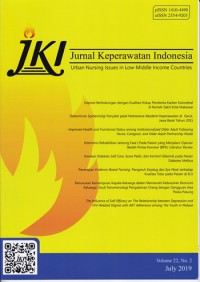
Jurnal
The Influence of Self-efficacy on The Relationship Between Depression and HIV-related Stigma with ART Adherence Among The Youth in Malawi
Depression and HIV-related stigma, among other factors, have been inversely linked independently with adherence to antiretroviral therapy (ART) among the youth. However, the processes through which the various factors influence this relationship is not fully known. Guided by Social Action Theory, we examined the interactive mechanisms through which depression, HIV-related stigma, and self-efficacy influenced ART adherence and whether or not these relationships are moderated by gender. A total of 450 HIV-positive youth (13–24 years) in Malawi receiving ART participated in this cross-sectional study. Moderated mediation analyses were conducted using Hayes’ PROCESS macro 2.11 in SPSS. ART adherence was measured by pill count. Findings showed that self-efficacy mediated the effects of depression and stigma on ART adherence. The analyses also revealed that gender moderated both the direct and indirect influence of depression and stigma (via self-efficacy) on ART adherence. Furthermore, self-efficacy simultaneously mediated and moderated the relationship between stigma and ART adherence. The interactive mechanisms through which various factors influence ART nonadherence must be considered to design effective interventions. To reduce the impact of depression and stigma on ART adherence, medication self-efficacy should be bolstered while taking gender in consideration.
Availability
No copy data
Detail Information
- Series Title
-
Jurnal Keperawatan Indonesia, Vol. 22 No. 2, July 2019
- Call Number
-
(05) 610.5 (910) FAK j
- Publisher
- Depok : Fakultas Keperawatan UI., 2019
- Collation
-
Hlm. 147-160
- Language
-
English
- ISBN/ISSN
-
1410-4490
- Classification
-
(05) 610.5 (910) FAK j
- Content Type
-
-
- Media Type
-
-
- Carrier Type
-
-
- Edition
-
Vol. 22 No. 2
- Subject(s)
- Specific Detail Info
-
-
- Statement of Responsibility
-
-
Other version/related
No other version available
File Attachment
Comments
You must be logged in to post a comment
 Computer Science, Information & General Works
Computer Science, Information & General Works  Philosophy & Psychology
Philosophy & Psychology  Religion
Religion  Social Sciences
Social Sciences  Language
Language  Pure Science
Pure Science  Applied Sciences
Applied Sciences  Art & Recreation
Art & Recreation  Literature
Literature  History & Geography
History & Geography